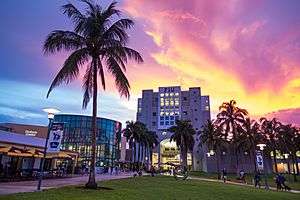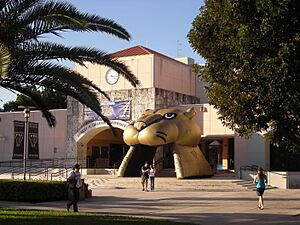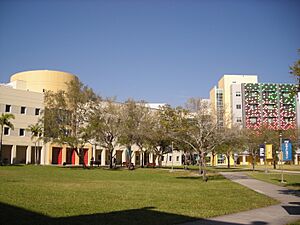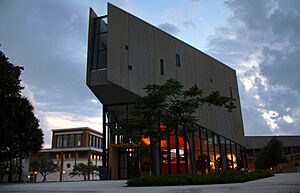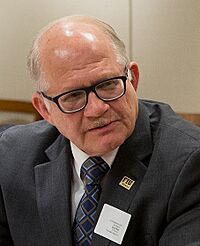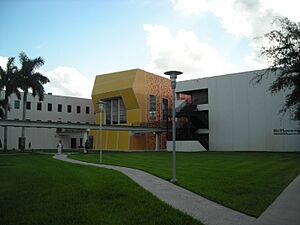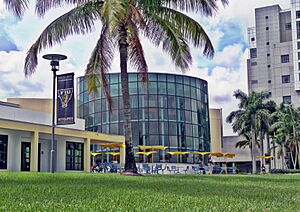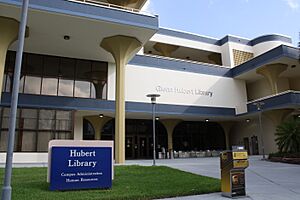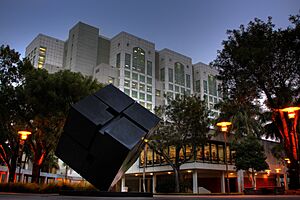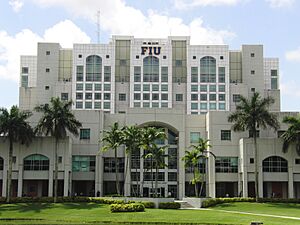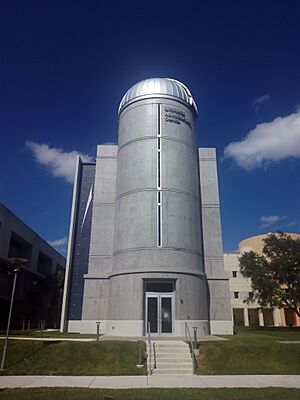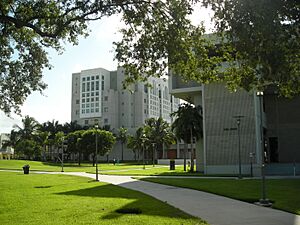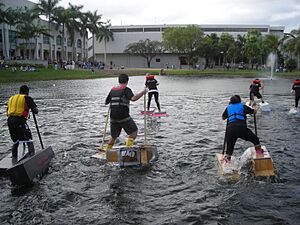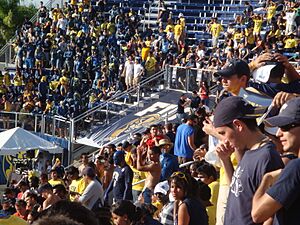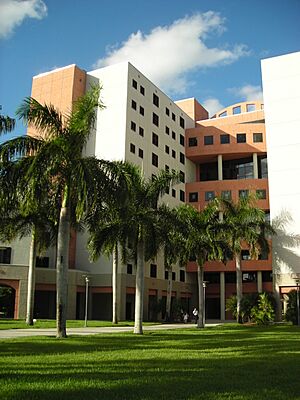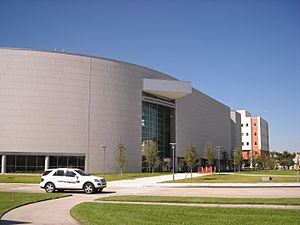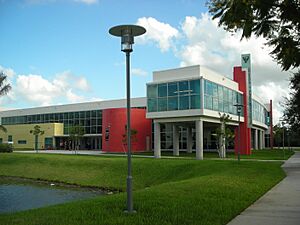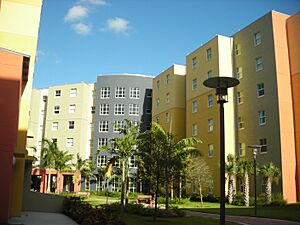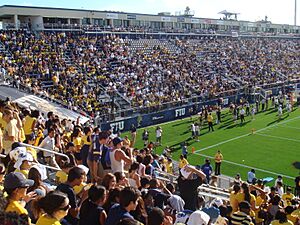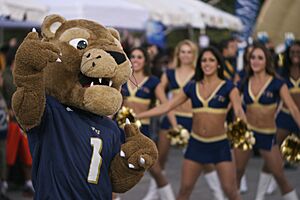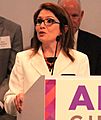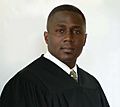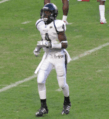Florida International University facts for kids
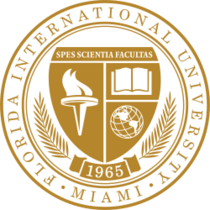 |
|
| Motto | Spes Scientia Facultas (Latin) |
|---|---|
|
Motto in English
|
"Hope, Knowledge, Opportunity" |
| Type | Public research university |
| Established | 1965 |
| Founder | Florida Legislature |
|
Parent institution
|
State University System of Florida |
| Accreditation | SACS |
|
Academic affiliations
|
|
| Endowment | $358 million (2025) |
| Budget | $1.7 billion (2021) |
| President | Jeanette Nuñez |
| Provost | Elizabeth M. Bejar |
| Chairman of the Board of Trustees | Carlos Duart |
|
Academic staff
|
7,665 (2021) |
|
Administrative staff
|
9,856 (2017) |
| Students | 54,085 (fall 2023) |
| Undergraduates | 44,045 (fall 2023) |
| Postgraduates | 10,040 (fall 2023) |
| Location |
,
,
United States
25°45′25″N 80°22′26″W / 25.757°N 80.374°W |
| Campus | Large suburb, 587.1 acres (237.6 ha) |
| Other campuses and centers |
|
| Newspaper | PantherNOW |
| Colors | Blue and gold |
| Nickname | Panthers |
|
Sporting affiliations
|
|
| Mascot | Roary The Panther |
Florida International University (FIU) is a large public university in Westchester, Florida, USA. It's known for its research and is one of the biggest universities in Florida. FIU was started in 1965 by the Florida Legislature and welcomed its first students in 1972.
FIU is part of the State University System of Florida. It's also recognized as a top research university. This means it does a lot of important studies and discoveries. The university has 11 main schools and colleges. They offer over 200 different study programs. FIU is approved by the Southern Association of Colleges and Schools (SACS).
FIU's sports teams are called the FIU Panthers. They compete in National Collegiate Athletic Association (NCAA) Division I sports. The Panthers play in the Conference USA (C-USA). They have won several championships.
Jeanette Nuñez became the interim President of FIU in February 2025. She was later officially confirmed in June 2025.
Contents
University History
The idea for a public university in Miami-Dade County first came up in 1943. State senator Ernest R. Graham suggested it. He believed the growing city needed its own state university.
In 1965, a bill was signed into law to plan for the new university. Chuck Perry became FIU's first president in 1969. He was only 32 years old, making him the youngest university president in the country at the time. Perry and his co-founders chose the site of an old airport for the campus.
The abandoned airport's control tower became FIU's very first building. President Perry's office was on the first floor. He decided the tower should never be torn down. Today, it's still on campus and is known by different names like the "Veterans Office" or "Public Safety Tower."
FIU Opens Its Doors
In September 1972, FIU opened with 5,667 students. This was the largest number of students for a new university at that time. Many students were about 25 years old. They often worked full-time jobs while going to school.
The first graduation ceremony was held in June 1973. About 191 students received their diplomas. By 1975, when President Perry left, over 10,000 students were attending classes. The campus had grown to five main buildings.
Growth and New Campuses
Harold Crosby became the second president in 1976. During his time, FIU opened its North Miami Campus in 1977. This campus is now called the Biscayne Bay Campus. President Crosby also focused on making FIU an international university. He started new programs with a global focus.
Gregory Baker Wolfe became the third president in 1979. Under his leadership, FIU became a four-year university. This meant students could start their studies there right after high school.
A Time of Big Changes
Modesto A. Maidique became FIU's fourth president in 1986. He was the first Hispanic leader of a state university in Florida. During his 23 years as president, FIU grew a lot. The campus tripled in size, and student numbers grew to almost 40,000.
Under President Maidique, FIU added many new schools. These included the Herbert Wertheim College of Medicine, the FIU College of Law, and the FIU School of Architecture. The university also started 22 new doctoral programs. Research at FIU greatly increased during this time.
FIU also became a member of Phi Beta Kappa. This is the oldest honor society in the United States.
Recent Years
Mark B. Rosenberg became FIU's fifth president in 2009. Under his leadership, FIU continued to grow. Over $600 million was spent on new buildings. These included new dorms, the FIU Stadium, and a recreation center. The university also started its football team in 2002.
FIU became known as a "very high research activity" university. This means it does a lot of important research. In 2015, Royal Caribbean opened a large training facility for its performers at FIU. This facility also offers learning chances for students.
In March 2018, a newly built pedestrian bridge near the university collapsed. This was a very sad event. Plans were announced in 2020 to design and rebuild the bridge.
President Rosenberg resigned in January 2022. Kenneth A. Jessell then became FIU's sixth president in October 2022. His term ended in 2025.
In April 2024, some students at FIU joined protests to support Palestinians in Gaza. They were part of a larger movement on campuses across the country.
Jeanette Nuñez, who was Florida's lieutenant governor and an FIU graduate, became the interim president in February 2025.
FIU Campuses
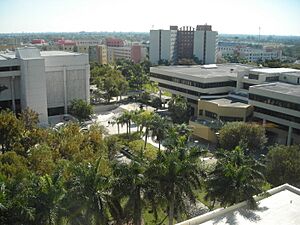
FIU has a main campus called the Modesto A. Maidique Campus (MMC). It's located in the University Park area of Westchester, Florida. This campus is about 344 acres. Most of the university's colleges, schools, and offices are here. The MMC is also home to the president's house, the performing arts center, and sports facilities like FIU Stadium.
The campus used to be an airport called Tamiami Airport. The old airport tower is now a historic building on campus. The Modesto A. Maidique Campus is a green campus with many lakes, a nature preserve, and over 90 buildings.
In 2009, the University Park campus was renamed the Modesto Maidique Campus. This change caused some debate among students and alumni.
Engineering Center
A short distance north of the main campus is the 38-acre Engineering Center. This center is home to part of the College of Engineering and Computing. It also has a special research facility for tiny technologies called Nanofabrication. Buses connect the Engineering Center to the main campus.
Biscayne Bay Campus
The Biscayne Bay Campus (BBC) is a waterfront campus in North Miami. It opened in 1977 and is about 200 acres. Because it's right on Biscayne Bay, it has a strong marine biology program. This campus also houses the School of Hospitality & Tourism Management and the School of Journalism.
Students can live on the Biscayne Bay Campus in the Bayview Student Living apartments. Buses also connect this campus to the main Modesto A. Maidique Campus.
Other Locations
FIU has other smaller centers around South Florida. These centers offer research, classes, and cultural events.
- The Downtown Miami Center is on Brickell Avenue. It offers classes, especially for business and international studies.
- The Wolfsonian-FIU Museum is in Miami Beach.
- The FIU at I-75 academic center is in Miramar. It helps students in Broward County.
- The Global Forensic and Justice Center in Largo, Florida focuses on forensic science and criminal justice.
How FIU Works
FIU is part of the 12-campus State University System of Florida. It's a major university for graduate research. Each year, it awards thousands of advanced degrees. FIU offers 191 different study programs. These include over 280 main subjects in 23 colleges and schools.
Student Government
The Student Government Association (SGA) helps run student life at FIU. It manages and funds over 300 student clubs and groups. The SGA has three parts:
- The Executive branch, led by the Student Body President.
- The Legislative branch, which is the Student Body Senate.
- The Judicial branch, which is the Supreme Court.
The Student Body President also serves on the FIU Board of Trustees. The SGA helps organize events like Homecoming and supports student spirit groups.
FIU Presidents
| President | Years Served |
|---|---|
| Charles Perry | 1965–1976 |
| Harold B. Crosby | 1976–1979 |
| Gregory Baker Wolfe | 1979–1986 |
| Modesto A. Maidique | 1986–2009 |
| Mark B. Rosenberg | 2009–2022 |
| Kenneth A. Jessell | 2022–2025 |
| Jeanette Nuñez | 2025- |
Colleges and Schools
FIU has many different colleges and schools where students can study:
- College of Architecture and the Arts (includes Architecture, Communication and Journalism, Music)
- College of Arts, Sciences and Education (includes Education, Environment, and Science)
- College of Business
- College of Engineering and Computing
- College of Law
- Herbert Wertheim College of Medicine
- Nicole Wertheim College of Nursing and Health Sciences
- Robert Stempel College of Public Health and Social Work
- Chaplin School of Hospitality and Tourism Management
- Steven J. Green School of International and Public Affairs
- Honors College
Academics and Learning
FIU offers many different academic programs. Students can earn bachelor's, master's, and doctoral degrees. Most of the teachers at FIU have the highest degrees in their fields. There are about 27 students for every teacher.
FIU focuses on making its academic programs better. The addition of the College of Medicine has increased the need for more classrooms and facilities.
Admissions
| 2023 | 2022 | 2021 | 2020 | 2019 | 2018 | |
|---|---|---|---|---|---|---|
| Applicants | 25,034 | 17,343 | 16,406 | 16,911 | 18,492 | 19,410 |
| Admits | 14,729 | 11,075 | 10,502 | 9,784 | 10,634 | 11,366 |
| Enrolls | 5,168 | 4,424 | 4,061 | 3,763 | 3,998 | 4,441 |
| Admit rate | 58.8% | 63.9% | 64.0% | 57.9% | 57.5% | 58.6% |
| Yield rate | 35.1% | 39.9% | 38.7% | 38.5% | 37.6% | 39.1% |
| SAT composite* | 1060–1240 (91%†) |
1070–1240 (90%†) |
1030–1220 (87%†) |
1110–1260 (92%†) |
1110–1280 (92%†) |
1090–1260 (77%†) |
| ACT composite* | 20–26 (9%†) |
21–26 (10%†) |
21–27 (13%†) |
23–29 (8%†) |
23–28 (8%†) |
23–27 (23%†) |
| * middle 50% range † percentage of first-time freshmen who chose to submit |
||||||
In Fall 2023, FIU had 54,085 students from over 130 countries. About 57% of students are women. Most students (90%) are from Florida.
For new students starting in Fall 2023, the average GPA was 4.1. Their average SAT score was 1150, and their average ACT score was 24.
The FIU School of Architecture is very competitive. In 2011, it had the lowest admission rate in Florida at 14%.
Enrollment Numbers
| Academic Year | Undergraduates | Graduate | Total Enrollment |
|---|---|---|---|
| 2018–2019 | 48,439 | 9,625 | 58,064 |
| 2019–2020 | 49,004 | 9,823 | 58,827 |
| 2020–2021 | 48,664 | 10,235 | 58,899 |
| 2021–2022 | 46,079 | 10,653 | 56,732 |
| 2022–2023 | 45,442 | 10,245 | 55,687 |
| 2023–2024 | 44,045 | 10,040 | 54,085 |
| Race and ethnicity (all undergraduate students, fall 2023) | |||
|---|---|---|---|
| Hispanic | 67% |
|
|
| Black | 11% |
|
|
| White | 9% |
|
|
| Foreign national | 7% |
|
|
| Asian | 3% |
|
|
| Other | 3% |
|
|
| Race and ethnicity (incoming freshman class, fall 2023) | |||
| Hispanic | 74% |
|
|
| Black | 9% |
|
|
| White | 8% |
|
|
| Foreign national | 3% |
|
|
| Asian | 3% |
|
|
| Other | 3% |
|
|
| Economic diversity (2017 cohort) | |||
| Low-income | 58% |
|
|
| Affluent | 42% |
|
|
In 2024, almost 3,800 FIU students were international students. They came from countries like China, Venezuela, and India. Most students are from Florida, especially from Miami-Dade and Broward counties.
University Rankings
| ARWU World | 501-600 |
|---|---|
| THES World | 401–500 |
| USNWR National University | 98 (tie) |
| Washington Monthly National University | 19 |
| Forbes | 138 |
| Business | 110–143 |
| Business: International Business | 4 |
| Business: Part-time MBA | 102 |
| Education | 112 |
| Engineering | 92 |
| Law | 60 |
| Medicine: Research | 106 |
| Medicine: Primary Care | 102 |
| Nursing: Master's | 47 |
| Nursing: Doctor of Nursing Practice | 56 |
| Biological Sciences | 203 |
| Biostatistics | 64 |
| Chemistry | 173 |
| Clinical Psychology | 101 |
| Computer Science | 110 |
| Criminology | 32 |
| Earth Sciences | 118 |
| Economics | 110 |
| Engineering: Undergraduate | 137 |
| Fine Arts | 178 |
| Health Care Management | 51 |
| History | 100 |
| Nursing: BSN | 96 |
| Nursing-Anesthesia | 88 |
| Occupational Therapy | 68 |
| Physical Therapy | 179 |
| Physics | 146 |
| Political Science | 109 |
| Psychology | 140 |
| Public Affairs | 62 |
| Public Finance and Budgeting | 24 |
| Public Health | 63 |
| Rehabilitation Counseling | 58 |
| Social Work | 72 |
| Sociology | 113 |
| Speech-Language Pathology | 146 |
In 2025, U.S. News & World Report ranked FIU as one of the top public universities in the U.S. It was tied for 46th best public university. It was also tied for 98th overall among all national universities.
In 2018, FIU was ranked first in the U.S. for giving bachelor's degrees to minority students. It was also highly ranked for master's and doctoral degrees for minorities.
International Programs
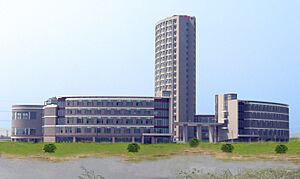
FIU has many programs that allow students to study abroad. Every year, over 1,000 students travel to different countries. They can take classes that count towards their degrees. FIU has agreements with over 70 partner universities around the world.
FIU has a presence in Genoa, Italy. The Wolfsonian-FIU Museum has a facility there. The School of Architecture also has facilities in Genoa for its students. In 2006, FIU opened the Florida International University Tianjin Center in China. This center is home to a branch of the School of Hospitality & Tourism Management.
Model United Nations
The FIU Model United Nations Program is a special program. In the 2018–2019 season, FIU MUN was ranked the top Model UN Team in North America.
FIU MUN also hosts a yearly conference for high school students. It's called Florida International Model United Nations (FIMUN). Over 500 high school students usually attend this conference.
FIU Libraries
FIU has six libraries. The Green Library is the main library and the biggest building on campus. Other libraries include the Glenn Hubert Library, the Wolfsonian Library, the Engineering Library, the Law Library, and the Medical Library.
Together, all of FIU's libraries have over 2 million books and many other resources. The Green Library has eight floors. It includes classrooms, study areas, and support services for students. It even has a Starbucks!
The FIU Law Library opened in 2002. It has three floors and a quiet reading room. The FIU Medical Library opened in 2009. It is currently located on the third floor of the Green Library.
The Glenn Hubert Library serves the Biscayne Bay Campus. The Wolfsonian Library is in Miami Beach. It focuses on art, design, and history from 1885 to 1945.
Research at FIU
Florida International University is a "very high research activity" university. This means it does a lot of important research. In 2021, FIU spent $246 million on research. It received $310 million in research awards.
International Hurricane Research Center
The International Hurricane Research Center (IHRC) is a special research facility. It's the only university-based center in the country focused on tropical storms. It has different labs for studying coasts, social science, and wind engineering.
The IHRC also has the FIU Wall of Wind (WoW). This is the largest and most powerful university research facility of its kind. It has 12 fans and can create winds like a Category 5 hurricane. This helps scientists study how hurricanes affect buildings and communities.
Student Life and Fun
Traditions at FIU
FIU has many fun traditions for students. New students can attend Panther Camp. This event helps them learn about the university and meet new friends. The Week of Welcome is held at the start of the fall semester. It includes many spirit events, like the Trail of the Torch. During this event, a special torch in front of the Primera Casa building is lit.
Living on Campus
FIU has student housing managed by the Office of Housing and Residential Life. About 3,300 students live on campus. They live in 10 apartment buildings and 6 residence halls. All rooms are either suite style or apartment style. This means students have their own bathrooms, not shared community ones.
On the Biscayne Bay Campus, students can live in Bayview Student Living apartments. These apartments overlook Biscayne Bay. FIU also offers Living Learning Communities (LLCs). These are special groups where students with similar majors or interests can live together.
Arts and Culture
FIU has three museums: the Frost Art Museum, the Wolfsonian-FIU Museum, and the Jewish Museum of Florida. The Frost Art Museum is on the main campus. It has a wide collection of art, from ancient artifacts to modern works. The Wolfsonian-FIU Museum in Miami Beach focuses on decorative art and design from 1885 to 1945.
FIU also has a large collection of sculptures around campus. You can see them in gardens, buildings, and walkways.
The School of Music puts on many concerts each year. They feature different styles of music like jazz and opera. The Department of Theatre also puts on plays. These shows are designed and directed by professionals.
The Florida International University School of Hospitality & Tourism Management helps host the yearly Food Network South Beach Wine & Food Festival. This is a big national event about food and drinks.
Student Media
FIU has its own student media. This includes PantherNOW, the student newspaper. It's published in print and has a website. FIU also has a student-run radio station called WRGP "The Roar."
FIU in TV and Movies
FIU's campus has been used as a set for many films, TV shows, and music videos.
- The TV show Miami Vice filmed an episode at FIU in 1986.
- Burn Notice also filmed scenes at the College of Business and Law Building.
- In 2007, Chris Brown filmed his music video for "Kiss Kiss" at FIU.
- Various Spanish-language TV shows (telenovelas) for Telemundo and Univision have filmed at FIU.
- In 2015, FIU hosted the Miss Universe 2014 pageant in the FIU Arena.
Sports at FIU
Florida International University has seventeen sports teams. They are called the Panthers. Their team colors are blue and gold. They compete in NCAA Division I sports as part of Conference USA.
The Panthers football team plays at Riccardo Silva Stadium, also known as "The Cage." The men's and women's basketball and volleyball teams play at the Ocean Bank Convocation Center. The baseball team plays at Infinity Insurance Park.
FIU's main sports rivals are Florida Atlantic University and the University of Miami. The football team plays against Florida Atlantic University each year in the Shula Bowl.
The Panthers football team won the Sun Belt Conference title in 2010. They also played in the Little Caesars Pizza Bowl that year and won. The men's basketball team has also made it to the NCAA tournament once.
Many FIU athletes have gone on to become professional or Olympic athletes. Some famous alumni include Mike Lowell (baseball), Raja Bell (basketball), and Carlos Arroyo (basketball).
Famous People from FIU
FIU has over 275,000 alumni (former students) all over the world. More than 10,000 students graduate from FIU every year. The Florida International University Alumni Association helps connect former students and hosts many events.
-
Ileana Ros-Lehtinen
Graduated 1975 & 1986
Former U.S. Representative -
Andy García
Actor -
Jeanette Nuñez
Graduated 1994 & 1998
Lieutenant Governor of Florida -
Dennis Lehane
Graduated 2001
Novelist & Screenwriter -
Carlos Arroyo
Graduated 2001
NBA Basketball Player -
Evelyn Sanguinetti
Former Lieutenant Governor of Illinois -
Aimee Carrero
Graduated 2008
Actress -
Barbara Lagoa
Graduated 1989
U.S. Circuit Judge -
Raja Bell
Graduated 1999
NBA Basketball Player -
Ian Richards
Graduated 1999
County Court Judge -
Francis Suarez
Graduated 2001
Mayor of Miami -
Richard Blanco
Graduated 1991
Inaugural Poet and Author
See also
 In Spanish: Universidad Internacional de Florida para niños
In Spanish: Universidad Internacional de Florida para niños


